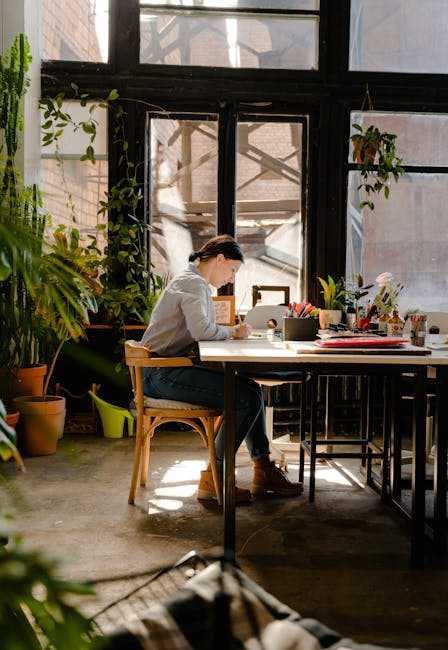Delve into the captivating world of still life art pieces, where everyday objects are transformed into mesmerizing works of art. From vibrant fruits to delicate flowers, these compositions invite viewers to pause and appreciate the beauty found in the ordinary. Let’s explore the intricacies and allure of still life art, where creativity meets stillness in a harmonious dance of colors and textures.
Table of Contents
- Exploring the Timeless Beauty of Still Life Art
- Mastering Composition: Key Elements in Still Life Art
- Capturing Emotions Through Inanimate Objects
- Elevating Your Home Decor with Still Life Art Pieces
- Q&A
- Closing Remarks


Exploring the Timeless Beauty of Still Life Art
In the realm of art, still life pieces hold a captivating allure that transcends time. These artworks, often depicting inanimate objects like fruits, flowers, and everyday items, invite viewers to pause and appreciate the beauty in simplicity. Each stroke of the brush, each play of light and shadow, breathes life into the ordinary, transforming it into something extraordinary.
Exploring a still life composition is like stepping into a frozen moment in time, where each element tells a silent story. From the delicate petals of a blooming rose to the rustic texture of a weathered book, every detail is carefully curated to evoke emotions and provoke contemplation. Through still life art, artists capture the essence of the transient, preserving fleeting moments for eternity, inviting us to see the world through their eyes.


Mastering Composition: Key Elements in Still Life Art
In still life art pieces, mastering composition involves a delicate interplay of key elements that bring a static scene to life. **Balance** is paramount, guiding the viewer’s eye seamlessly across the canvas or paper. Achieving a harmonious equilibrium between the objects within the composition can evoke a sense of tranquility or drama, depending on the artist’s intent. Whether playing with symmetry or asymmetry, balance lies at the heart of compelling still life artworks.
Contrast serves as a powerful tool in the artist’s arsenal, adding depth and visual interest to the arrangement. By juxtaposing light and shadow, vibrant hues and muted tones, or smooth textures against rough surfaces, artists can create dynamic and captivating compositions. Contrast not only draws attention to focal points but also lends a sense of drama and vitality to still life art pieces, inviting viewers to explore the nuances within the seemingly ordinary objects.
Capturing Emotions Through Inanimate Objects
In the world of still life art pieces, everyday objects transcend their mundane existence to become vessels of emotion and storytelling. A single vase on a table can evoke feelings of solitude, while a pair of discarded shoes invites nostalgic memories of journeys taken. The artistry lies in capturing these emotions through the inanimate, infusing soul into objects that would otherwise go unnoticed.
Through meticulous composition and selective lighting, artists breathe life into the ordinary, turning a simple fruit bowl into a symbol of abundance or scarcity. Each brushstroke, each shadow cast, holds a narrative waiting to unfold. In the world of still life art, the quiet contemplation of objects speaks volumes, inviting viewers to connect with the essence of the everyday in a profound and intimate way.

Elevating Your Home Decor with Still Life Art Pieces
When it comes to home decor, still life art pieces can add a touch of elegance and sophistication to any room. These art pieces, depicting inanimate objects like flowers, fruits, and everyday items, have a timeless appeal that can effortlessly elevate the aesthetics of your space.
Whether you prefer classic oil paintings or modern interpretations, incorporating still life art into your decor can create a focal point that sparks conversation and adds visual interest. **Mix and match different styles** to create a curated look that reflects your personality and tastes. By strategically placing these artworks in key areas of your home, you can transform ordinary spaces into extraordinary showcases of artistry.
Q&A
Q: What defines a still-life art piece?
A: Still-life art pieces typically feature inanimate objects, such as fruits, flowers, or everyday items, arranged in a composition to emphasize form, color, and texture.
Q: Why are still-life art pieces significant in the art world?
A: Still-life art allows artists to explore light, shadow, and composition in a controlled setting, showcasing their skills in representation and creating intriguing visual narratives.
Q: How can viewers engage with still-life art pieces on a deeper level?
A: Observing still-life art pieces encourages viewers to reflect on the beauty of ordinary objects, contemplate themes of mortality and impermanence, and appreciate the craftsmanship involved in capturing intricate details.
Q: Can still-life art pieces evoke emotions in viewers?
A: Despite focusing on inanimate objects, still-life art can evoke various emotions through choice of subject matter, composition, and color palette, inviting viewers to connect with the artist’s interpretation of the objects and the stories they convey.
Q: What role does still-life art play in art history?
A: Still-life art has been a significant genre throughout art history, reflecting societal values, cultural symbolism, and artistic innovations across different periods, providing a rich tapestry of artistic expression and technical mastery.
Closing Remarks
As we conclude our journey exploring the captivating world of still life art pieces, we hope this article has sparked a newfound appreciation for the beauty found in everyday objects frozen in time. Whether you’re an artist seeking inspiration, a collector on the hunt for the next masterpiece, or simply an admirer of art’s ability to transcend the ordinary, still life remains a timeless and intriguing genre. Take a moment to pause, observe, and savor the artistry that surrounds us in the seemingly mundane – for within the stillness lies a symphony of stories waiting to be discovered. Thank you for joining us on this artistic voyage, and may your days be filled with moments of quiet contemplation and aesthetic delight.
[elementor-template id=”1335″]
[elementor-template id=”1377″]
